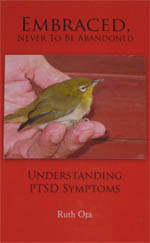How can laughter play a part in PTSD – Post Traumatic Stress Disorder? Well, this is what I have learned as a spouse of a person with PTSD. Now, I do understand that each person is different and what works for one may not necessarily work for another.
Where I live there are two entities of the Veterans Administration. One is called: The Veterans Administration, the other is called: The Veterans Center. I have been told the Veterans Center is under the umbrella of the Veterans Administration, but they each have their own monies to spend to be able to do what they see a need to do.
I came to learn that at the Veterans Center, they will counsel with wives, children, and relatives of loved ones who are suffering with PTSD. You see, the people who are closest to the person with PTSD need assistance too; as living with PTSD can be very stressful. Learning how to deal with the symptoms and actions of loved ones with PTSD can help all parties involved so very much. It was wonderful to learn there was help for me and I found it at the Veterans Center, in the city where I live. There is no charge for this wonderful service, freely given, by trained Clinical Personnel, most of which, I discovered to be, persons with PTSD themselves. This was very helpful! THEY could speak from experiences they had gone through, which helped “us” who were trying to learn how to respond to our mates or loved ones, who have PTSD.
What kind of things get learned? What should one do to help their spouse with PTSD?
- Accept him or her for who they are and how they think; as they have been trained intensively, to think this way .
- Always treat them with kindness; in combat, they experienced very little kindness.
- Always find ways to give them encouragement so they can feel like they belong in this new living arrangement called Civilian Life.
- Support them and their feelings.
- Do Not Judge them or their actions – get help to understand why they might be doing what they are doing or saying, etc.
- Give them the opportunity to understand how to make their civilian life better.
- By being kind, accepting, encouraging, and supportive toward them, they will be able to see new possibilities.
- By realizing there are possibilities, there now can be options, for both parties to move forward.
- It will be important for the spouse to be able to adjust to the person with PTSD and not feel that the person with the PTSD must do all the changing.
- Genuine love, empathy, and humor, will make a HUGE healing difference.
There is much to learn and apply, but aren’t our loved ones worth it? We must always remember their sacrifice and dedication. They fought and sacrificed for our Country. They fought and sacrificed for us…that we might sleep peacefully at night…that we might be free from those who would want to harm us…they instead took the harm that we are now seeing in them, as they return from their deployments. They will need our love, caring, understanding, and laughter to regain their noble standing. After all, they are our heroes, no matter how you slice it. We must not abandon them, when they need us the most…they did not abandon us or their Country.
To understand even more about symptoms go to: http://bit.ly/hkv9aZ.
©Ruth Ota, 2011
Written by: Ruth Ota

Speak Your Mind